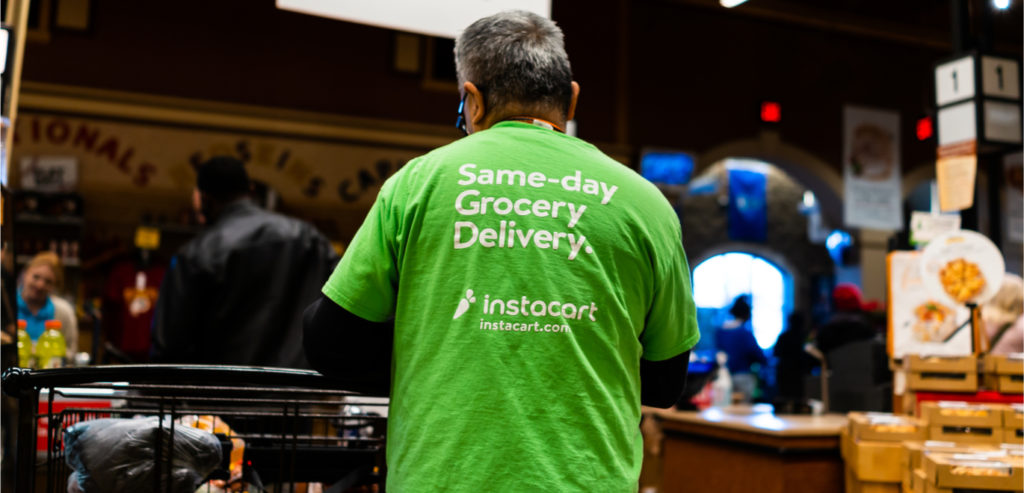(Bloomberg)—Instacart Inc. is acquiring Caper AI, a startup that makes self-checkout shopping carts, for $350 million in cash and stock in an effort to tap more areas of growth ahead of the online grocery giant’s anticipated public stock offering.
New York-based Caper, which was founded in 2016, uses image-recognition cameras and weight sensors to automatically detect items as they’re placed in the cart, eliminating the need to individually scan groceries. The “smart” carts are also equipped with a payment terminal that allows customers to check out without having to wait in line. The carts are currently available for shoppers at select locations that Instacart already works with, like Kroger Co. and Wakefern Food Corp. in the U.S. and other retailers in Canada, Spain and France, Instacart said in a statement Tuesday. Kroger is No. 8 in the 2021 Digital Commerce 360 Top 1000, while Wakefern is No. 434.
The acquisition is Instacart’s fifth since its founding in 2012, and the largest yet as the company ramps up investments to boost its technology offerings for retailers.
Instacart’s enterprise offerings range from last-mile delivery to building websites and rewards programs. CEO Fidji Simo said in an interview that she’s made this part of the business “even more of a priority” since taking the top job in August. “I think it’s incredibly important for Instacart to really be the chief ally to grocers. Anything that helps them, helps us.”
The San Francisco-based company is gearing up to go public just as competition in grocery delivery in the U.S. grows with DoorDash Inc. and Uber Technologies Inc. ramping up services of their own. Simo said she’s “confident in Instacart’s unit economics,” and that while the company is still profitable, she will be more focused on growth going forward. Instacart delivers for 55 retailers listed in the 2021 Digital Commerce 360 Top 500.
Caper, which also makes a self-checkout counter in addition to its carts, will streamline the in-store shopping experience and ultimately persuade shoppers to buy more, Simo said. The technology opens up other potential revenue streams through a subscription service fee and advertising on the cart’s touchscreen. Eventually, Instacart expects to integrate Caper into the marketplace app and websites of retail partners so customers can build shopping lists online and access them in-store.
Instacart also recently acquired FoodStorm, which offers order-ahead and catering technology for retailers. Simo said Instacart will be making additional investments in the coming months in a bid to keep grocers of all sizes competitive. “Amazon is investing a lot on these kinds of technologies, but that kind of capital expenditure is out of reach for many grocers. It’s important for us to offer them the ability to compete,” Simo said.
In other vendor news:
- Amazon.com Inc. (No. 1) expanded its partnership with same-day delivery service Deliveroo, granting all Prime members in the U.K. and Ireland access to Deliveroo Plus. The subscription program grants members free delivery on food orders over 25 pounds ($35). Seattle-based Amazon backed Deliveroo when it was a startup, and had a stake of about 12% after the food delivery company’s stock market debut earlier this year. Deliveroo also recently hired former Amazon executive Devesh Mishra to be chief product and technology officer. The company reported a surge in revenue and orders in the first half of this year as people kept up orders even as the economy reopened.
- Payment vendor Bolt announced a new round of funding, raising $393 million in a Series D. The one-click-payment option has now raised more than $600 million and works with Top 1000 retailers like Casper Sleep Inc (No. 167), Lucky Brand LLC (No. 658) and Betabrand Inc. (No. 771). The new funding will be used to manage growth—Bolt says it’s on track to count 11% of U.S. shoppers as part of its network by the end of the year thanks to deals with Authentic Brands Group, owner of Aeropostale Inc. (No. 281) and Nine West Holdings Inc. (No. 300).
- Apparel giant Gap Inc. (No. 19) announced this month that it acquired artificial intelligence company Context-Based 4 Casting Ltd. (CB4). The AI company uses its machine-learning capabilities to ease problems in stores, spot inventory discrepancies, make sure pricing matches in stores and online, and keep local stores stocked with popular products. Gap acquired 3D fit technology vendor Drapr earlier this year as it expands its in-house technology team under its first chief growth officer, a position added last year.
- Apparel reseller Poshmark Inc. made its first acquisition last week, buying a technology platform to expand the authentication process for merchandise that people sell on its site. Suede One, which was founded last year, uses machine learning, computer vision and human review to authenticate sneakers. A Poshmark spokesperson said the technology would help authenticate items that cost less than $500. The reseller uses human review to authenticate orders over $500 and has a policy that guarantees full refunds for merchandise that doesn’t match its description. Poshmark is No. 33 in the ranking of Digital Commerce 360 Top 100 Online Marketplaces.
Favorite
Credit: Source link




















